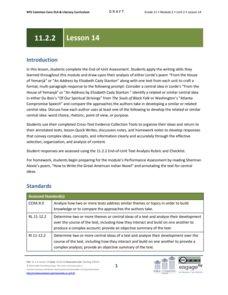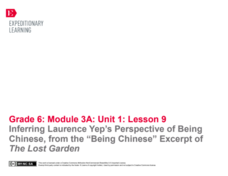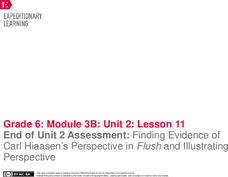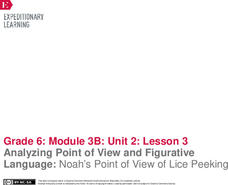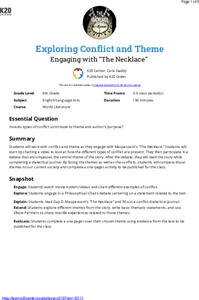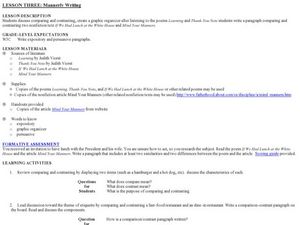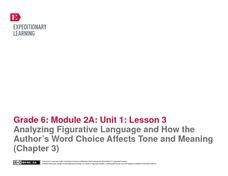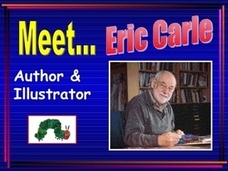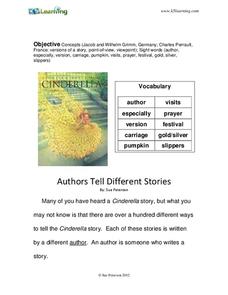EngageNY
Grade 11 ELA Module 2: Unit 2, Lesson 2
How did Elizabeth Cady Stanton advocate for women's rights? Pupils consider this question as they continue reading "An Address by Elizabeth Cady Stanton." They complete a Quick Write, analyzing how satire and sarcasm advance the author's...
EngageNY
Grade 11 ELA Module 2: Unit 2, Lesson 7
Joan of Arc, Mother Teresa, Rosa Parks ... many inspirational women have paved the way for future generations, and Elizabeth Cady Stanton is no exception. Scholars continue reading and analyzing "An Address by Elizabeth Cady Stanton."...
EngageNY
Grade 11 ELA Module 2: Unit 2, Lesson 14
It's time to put it all together! Using the resource, scholars complete an end-of-unit assessment. They write a multi-paragraph essay comparing Audre Lorde's "From the House of Yemanjá" or "An Address by Elizabeth Cady Stanton" to...
EngageNY
Inferring Laurence Yep’s Perspective on the Police, from the Crime in the Neighborhood Excerpt of The Lost Garden
Gist get to the point! Pupils read another excerpt from The Lost Garden, author Laurence Yep's autobiography. Working with partners, scholars annotate the text to look for the gist and record unfamiliar vocabulary in their word catchers.
EngageNY
Inferring Laurence Yep’s Perspective of Being Chinese, from the “Being Chinese” Excerpt of The Lost Garden
It's all about perspective! Using the resource, scholars read a third excerpt from Laurence Yep's autobiography, The Lost Garden. As they read, individuals complete graphic organizers using clues from the text to infer the author's...
EngageNY
Finding the Gist of the Immediate Aftermath: Excerpt of “Comprehending the Calamity”
Brace for the aftershocks! Scholars read an excerpt from a primary source document about the immediate aftermath of the 1906 San Francisco fire and earthquake. Next, pupils complete an anchor chart, analyzing how the author introduces,...
EngageNY
Carl Hiaasen’s Perspective of Florida: Part 3
What is your perspective? Scholars read Florida: A Paradise of Scandals Excerpt 2 and look for unfamiliar words. They determine author perspective by completing Gathering Evidence of Hiaasen’s
Perspective: Part three graphic organizer...
EngageNY
End of Unit 2 Assessment: Finding Evidence of Carl Hiaasen’s Perspective in Flush and Illustrating Perspective
The end is here. Scholars work independently on End of Unit 2 Assessment: Finding Evidence of Carl Hiaasen’s Perspective in Flush and
Illustrating Perspective. Learners use their graphic organizers and text to write to a prompt asking...
EngageNY
Analyzing Point of View and Figurative Language: Noah’s Point of View of Lice Peeking
Read along with me. Two learners read the parts of Noah and Lice in Flush as the rest of the class follows along. Readers look for unfamiliar words and the use of figurative language in the text. They complete graphic organizers and...
Simon & Schuster
Classroom Activities for The Count of Monte Cristo by Alexandre Dumas
Alexandre Dumas' The Count of Monte Cristo is the featured text in three classroom activities. The first activity asks readers to analyze the description of Edmond Dantes in Chapter XVII, paying particular attention to Dumas' word choice...
National Endowment for the Humanities
Literary Genres in “Moby-Dick”
Moby Dick is more than a whale of a tale narrated by Ishmael. A lesson studying Herman Melville's classic novel asks readers to examine the different genres the author weaves into his story. Instructors model how to conduct a stylistic...
K20 LEARN
Exploring Conflict And Theme: Engaging With "The Necklace"
Teach young scholars how to determine the theme of a story, an insight the author wants to share with readers, with a lesson that uses Guy de Maupassant's "The Necklace" as an anchor text. Learners examine the internal and external...
K20 LEARN
Between The Lines: Inferences In The Narrative Life Of Frederick Douglass Excerpt
Good literature can be much like an iceberg requiring readers to presume that the bulk of the meaning may be inferred to be found below the surface. Here's a lesson that asks scholars to conduct a close reading of passages from The...
K20 LEARN
It's All About Balance! Parallel Structure
I came, I saw, I conquered! Parallel structure, employed by writers even before Julius Caesar, is the focus of a instructional activity that teaches young writers the power of this rhetorical device. Class members analyze speeches by Dr....
Curated OER
A Plump and Perky Turkey
Help readers recognize elements in a story. They will use pictures and text to gain meaning from written material. Have learners listen to the story A Plump and Perky Turkey and participate in a discussion. They recognize the Internet...
Curated OER
Mannerly Writing
Writers draft paragraphs comparing and contrasting the author's viewpoint in two poems. They also discuss the differences between an informational text and a poem regarding manners. Rubric and assessment are provided.
Curated OER
Imitating An Author's Style
Students explore author's style. In this literature instructional activity, students read and take notes on a short story of their choice. Students write an original short story imitating the author's style.
EngageNY
Analyzing Figurative Language and How the Author’s Word Choice Affects Tone and Meaning (Chapter 3)
How figurative language affects the tone and meaning in Chapter Three of Christopher Paul Curtis' Bud, Not Buddy is the focus of a series of exercises that ask readers to locate, record, and analyze Curtis' word choices.
Curated OER
Tomie dePaola Author Study
Using Tomie de Paola's books for an author study can get students thinking about characters, plot, and illustrations.
Curated OER
To Entertain
Second graders consider the author's purpose for writing a text. In this author's purpose instructional activity, 2nd graders discuss reasons why author's write a book and how it can often be for entertainment. Students read a book,...
Curated OER
Meet...Eric Carle
An author study PowerPoint introduces the author and illustrator, Eric Carle. The slides contain a variety of information about the author; such as a list of his books, examples of his art work, and details of his personal life. The...
Curated OER
Text Features of a Story
Bring the enjoyable story of Anansi and the Moss-Covered Rock by Eric A. Kimmel to your young readers. After reading the story as a class, students answer questions about a reading and make a graphic organizer. They make predictions,...
Curated OER
The Romantic Period
What does the term romantic mean? As you introduce your class to the Romantic period and famous authors, artists, and musicians from the time period, make sure they know what sets this movement apart from previous movements! Several...
K5 Learning
Authors Tell Different Stories
The story of Cinderella is a popular one! So much so, there are multiple versions of the story being told around the world. With this collection of activities your young readers receive background information about two versions...
Other popular searches
- Authors Purpose
- Author's Purpose
- Authors Point of View
- Authors Purpose Powerpoint
- Authors Purpose Mini Lesson
- Authors Purpose Passage
- Georgia Authors
- Authors Study
- Teaching Author's Purpose
- Student Authors
- Children's Authors
- Main Idea Authors Purpose




